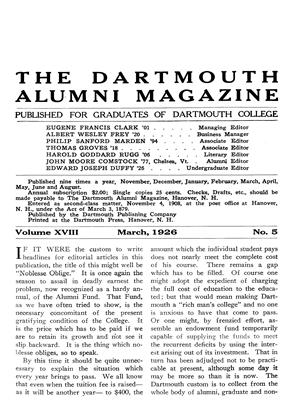Following is reprinted a communication written to The Dartmouth by Dr. William Patten, of the Biology Department, in which voice is given to the feeling of a large part of the Hanover community for the efforts which have made "faculty pond" a winter pleasure spot.
"To the Editor of THE DARTMOUTH: "All of us, I am sure, were glad to hear that this winter a serious attempt will be made to keep the 'Faculty' pond cleared for skating. For skating is one of the best and most democratic of outdoor sports. It involves the minimum drudgery in training for intercollegiate events, and the minimum expenditure for personal outfit. And as yet skating has developed little or no artificial requirements of a social nature, or much, if any, ornamental toggery. All one needs in addition to what most of us already have, is a bit of ice and a pair of skates. And skates are inexpensive, they are seldom lost, and never wear out.
"Skating may be enjoyed for its own sake, day or night, alone, or to the accompaniment of music and good fellowship. It may call for the competitive exercise of every one of those youthful faculties of strength and agility, courage and endurance, which so strongly appeals to all of us at some time in life. It may invite us to long and adventurous excursions into out of the way places, or it may provide a pleasurable outlet for nothing more than the spirit of aimless play.
"It is a community activity rather than collegiate, and primarily for the participants, not for the parasites of "sport." It is one of the very few activities whose thrills never satiate or corrupt, and where the possibilities of new achievements in the finer arts of skating are inexhaust ible.
"Like all dramatic arts—where complex emotions and rhythmic action play their respective parts, rather than sheer strength and pugnacity —it is open on equal terms to both sexes and to all ages, as long as physical activity and progressive achievement is a source of pleasure. And, if very fortunate, one may, as in dancing, skate in cooperative rhythm with some congenial partner when all the lights and shades of romance are palpably present, or lurk, in expectation, just around the corner.
"Dartmouth, because of its topographic and climatic setting, is an ideal place for skating, with, at times, more than a spice of danger on an explorable river, and with reasonable safety at all times on the more prosaic pond.
"It may not generally be known that some 25 years ago, or thereabout, a small group of professors 'made' the faculty pond and started a country club which was the progenitor of our present family of outdoor sports, exclusive of football, baseball, and the like. Mr. C. P. Chase, at that time the college treasurer, generously allowed the use of his grounds for that purpose, and the pond, let it be said, lest we forget, is still private property.
"Where the pond is now, was then an unsightly swamp, and just beyond, to the north, was an ill-smelling mudhole, or open cesspool, into which flowed the refuse of the hospital. The swamp was cleared of bushes, a dam was built, the cesspool drained, and many other improvements were made by the personal labor and financial contributions of those who were especially interested in the project. Prominent among these active and farsighted professors, were 'Tute' Worthen, 'Bubby' Bartlett, 'Stubby' Wells, and 'Chuck' Emerson.
"A part of the scheme was to make a place for golf, snowshoeing, tennis, trap shooting, and skating, sports which at that time had little or no attraction for the undergraduates. Trap shooting was short lived and temporarily vanished. Tennis, once a much despised 'ladies' game,' to Dartmouth men, was also short-lived in its earlier home on the country club grounds. But for a long time it flourished on private faculty courts, all but one of which have now disappeared. Golf, tennis and skiing have been well supported and have grown up beyond all expectation. But during all these years, very little has been done for skating.
"Now the outlook is more promising. But we must not expect too much, nor be impatient with slow progress. It is a difficult and ex:pensive job to provide good ice, with an average total snowfall of about four feet for the three middle w:'nter months, to say nothing of other difficulties. And good skaters, like good performers in any sport, can be developed only after long practice and encouragement.
"We hope that this undertaking, which is preeminently a community affair, will receive from all quarters the financial support it so well deserves, and that this winter will mark the beginning of a new era in the growth of winter sports in Hanover."
 View Full Issue
View Full Issue
More From This Issue
-
 Article
ArticleWHAT'S THE MATTER WITH FOOTBALL?
March 1926 -
 Article
ArticleTHE BEGINNINGS OF ORGANIZED SKIING AT DARTMOUTH
March 1926 By Fred H. Harris '11 -
 Article
ArticleIF IT WERE the custom to write
March 1926 -
 Article
ArticleTHE UNDERGRADUATE CHAIR
March 1926 -
 Class Notes
Class NotesClass of 1918
March 1926 By Frederick W. Cassebeer -
 Class Notes
Class NotesClass of 1916
March 1926 By H. Clifford, Bean
Article
-
 Article
ArticleSummer School Announcement
May, 1911 -
 Article
ArticleGreen Derby
February 1949 -
 Article
ArticleDiary of a Freshman
January 1933 By Aldis P. Butler '36 -
 Article
ArticleThayer School
May 1954 By EDWARD S. BROWN JR. '35 -
 Article
ArticleBig Green Teams
June 1975 By JACK DEGANGE -
 Article
ArticleDartmouth From Without
JANUARY 1932 By James Weber Linn


